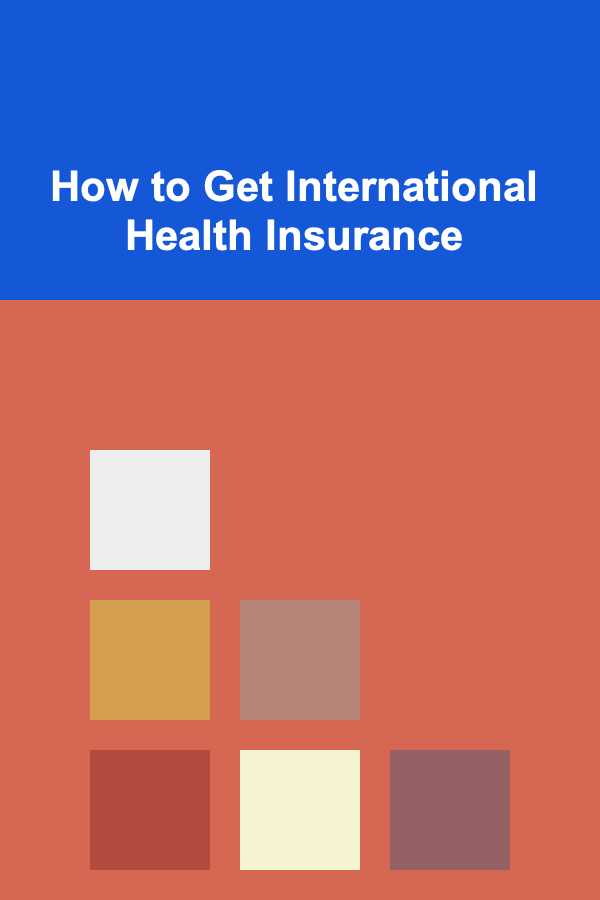
How to Get International Health Insurance
ebook include PDF & Audio bundle (Micro Guide)
$12.99$9.99
Limited Time Offer! Order within the next:

In a world that is becoming increasingly interconnected, the importance of securing international health insurance cannot be overstated. Whether you're an expat, a frequent traveler, a digital nomad, or someone working abroad, health insurance is an essential aspect of planning your move. International health insurance ensures that you are covered in case of medical emergencies or routine health concerns, no matter where you are located globally. In this article, we will explore the steps, considerations, and options for getting international health insurance, and why it's crucial for protecting your health while abroad.
Why You Need International Health Insurance
Health insurance is a vital part of life, offering peace of mind and protection against the financial burdens of medical care. When traveling or living internationally, the risks and costs associated with healthcare can increase significantly. Healthcare systems vary from country to country, and what may be considered basic coverage in one country could be unavailable or prohibitively expensive in another.
Here are several reasons why international health insurance is essential:
- Access to Quality Healthcare: Some countries have healthcare systems that are either subpar or difficult to navigate for foreigners. International health insurance ensures you have access to reputable healthcare providers wherever you are.
- Emergencies and Medical Evacuations: In case of a severe health emergency, international health insurance can cover the costs of medical evacuation to a country where you can receive better care.
- Preventing High Medical Costs: Healthcare in many countries can be very expensive, especially for foreigners who are not covered by local insurance. International health insurance mitigates these high costs.
- Coverage for Preventative Care: Many international health insurance plans offer coverage for routine checkups, vaccinations, and preventive care, which is essential for maintaining good health while abroad.
- Peace of Mind: Knowing that you're covered in case of a health issue allows you to focus on your work, studies, or leisure activities without constantly worrying about what will happen in case of illness or injury.
Steps to Getting International Health Insurance
Getting the right international health insurance requires a bit of research and understanding of your needs. It's not just about picking a random policy; rather, you need to tailor your plan to suit your lifestyle, health requirements, and the places where you will spend time. Here is a step-by-step guide on how to secure international health insurance.
1. Assess Your Health Insurance Needs
Before diving into the world of international health insurance, it is crucial to assess your needs. The first step is to determine your situation, such as:
- Type of Coverage: Are you looking for a comprehensive policy that covers everything from routine checkups to emergencies, or are you looking for emergency-only coverage? Some plans offer full coverage, including dental, vision, and mental health care, while others may only cover medical emergencies.
- Length of Stay: Are you traveling or living abroad temporarily, or are you planning on staying for an extended period, such as several years? The duration of your stay will help determine whether you need short-term or long-term coverage.
- Countries You Will Be in: Healthcare systems and medical costs vary widely from country to country. Determine the countries where you will live or travel, as this can influence the type of policy you need. Some countries may have universal healthcare for residents, while others might require private health insurance for foreigners.
- Pre-existing Conditions: If you have any pre-existing health conditions, it's essential to find an insurance provider that will cover these conditions or at least provide partial coverage for related expenses.
- Family or Solo Coverage: If you're traveling with family members, you'll need a family health insurance plan. Be sure to check if your children or spouse are covered under the policy.
By considering these factors, you'll have a better idea of the coverage you need.
2. Research Health Insurance Providers
Once you've identified your health insurance needs, it's time to start researching international health insurance providers. There are numerous global insurers that cater to expats, digital nomads, and travelers, such as:
- Cigna Global: Offers comprehensive global coverage with customizable options based on your location, budget, and medical needs.
- Allianz Care: Known for its wide-reaching network of healthcare providers and flexible plans that cater to people living abroad.
- Bupa Global: Offers tailored health insurance plans for individuals, families, and businesses with an extensive international network of healthcare facilities.
- AXA PPP International: A major insurer providing a range of international healthcare plans with access to high-quality treatment worldwide.
- GeoBlue: Specializes in offering coverage for Americans living abroad or U.S. citizens traveling internationally.
When comparing providers, look for the following factors:
- Coverage Options: Make sure the provider offers comprehensive medical coverage and emergency evacuation options. Review what's included (or excluded), such as outpatient care, dental, maternity care, and mental health services.
- Network of Hospitals: Check if the insurer has a network of hospitals in the countries you plan to visit or reside in. Having access to reputable medical facilities can be crucial in an emergency.
- Claims Process: Make sure that the claims process is simple and transparent. Some insurers offer a 24/7 helpline, while others may have local agents who assist with claims.
- Reputation and Reviews: Research the insurer's reputation in terms of customer service, claims resolution, and overall satisfaction. Websites like Trustpilot, insurance forums, and expat communities are great places to check reviews.
- Price and Deductibles: Compare prices and premiums, but also be aware of deductibles and any co-payments that might apply. While it's tempting to go for the cheapest option, it's better to invest in a policy that offers more value for your specific needs.
3. Choose the Right Plan
After researching your options, you will need to choose the plan that best fits your needs. Here are some key elements to consider when making your selection:
- Premiums: Monthly premiums are typically based on your age, coverage level, and the countries you will be in. While it may be tempting to opt for a low premium, ensure the plan covers the services you need, such as evacuation or specific medical treatments.
- Exclusions: All health insurance plans have exclusions. Make sure you understand what is not covered under your policy. Common exclusions might include certain pre-existing conditions, high-risk activities, or elective surgeries.
- Deductibles and Co-pays: Review the deductibles and co-pays associated with the policy. Higher deductibles can lower your premium but might result in higher out-of-pocket costs when seeking medical care.
- Repatriation: Some policies offer repatriation services, meaning they'll cover the costs of transporting you back to your home country in case of a serious illness or injury. This is especially important if you're living far from home.
4. Provide Required Documentation
Once you've chosen a health insurance provider and plan, the next step is to submit the necessary documentation. Depending on the insurer and the country where you will reside, the documents you need may vary, but they typically include:
- Personal Information: A valid passport or identification card, proof of nationality, and details of your intended stay.
- Health History: Some insurers may require you to fill out a health questionnaire or provide medical records if you have pre-existing conditions.
- Proof of Residence: For expats, proof of residence in the country you're moving to might be necessary, such as a lease agreement or visa.
Be sure to check with the provider about any additional paperwork they may require.
5. Understand the Policy Terms and Conditions
Before signing the contract, carefully read through the policy's terms and conditions. Pay special attention to the following:
- Policy Period: Ensure the policy is valid for the entire duration of your stay or travel.
- Renewability: Some international health insurance policies are renewable, while others are only valid for a set period. Understand the renewal terms and the process for extending coverage if necessary.
- Emergency Assistance: Check the availability of emergency assistance services and the process for seeking help in urgent situations.
- Exclusions: Revisit the exclusions to ensure that the policy will cover your specific needs, especially if you engage in high-risk activities like sports or travel to remote areas.
6. Purchase Your Insurance
Once you're satisfied with the terms and conditions of your plan, it's time to finalize the purchase. Many international insurers allow you to buy policies online, while others might require you to speak with an agent.
Ensure you have the following ready:
- Payment Information: Most insurers accept credit card payments, and some may allow you to pay via bank transfer.
- Confirmation: After payment, you should receive an email or document confirming your coverage. Keep a copy of this confirmation in a safe place.
7. Stay on Top of Your Coverage
After purchasing international health insurance, make sure you stay informed about any changes in coverage, policy renewal dates, and any updates regarding exclusions or added benefits. Many insurance providers offer mobile apps that allow you to access your coverage details and find medical facilities worldwide.
Conclusion
Securing international health insurance is a vital step in ensuring that you remain covered no matter where life takes you. Whether you are traveling for a few weeks or relocating for years, having the right insurance can save you from unexpected medical expenses and provide peace of mind. By following the steps outlined in this article---assessing your needs, researching providers, and selecting the right plan---you can ensure that you are well-protected while living or traveling abroad.

How to Foster a Culture of Organization in Your Home
Read More
How to Plan a Last-Minute Home Party Without the Panic
Read More
How to Research and Analyze Stocks Before Investing
Read More
How to Stage Your Home's Entryway to Make a Strong First Impression
Read More
How to Use Shelving Units for Maximum Craft Room Organization
Read More
How to Choose a Banking Solution for Global Travel
Read MoreOther Products

How to Foster a Culture of Organization in Your Home
Read More
How to Plan a Last-Minute Home Party Without the Panic
Read More
How to Research and Analyze Stocks Before Investing
Read More
How to Stage Your Home's Entryway to Make a Strong First Impression
Read More
How to Use Shelving Units for Maximum Craft Room Organization
Read More